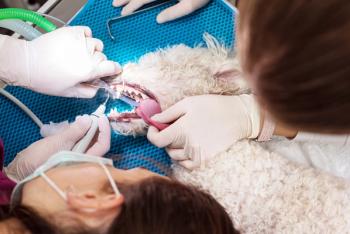
NAVTA Nurse Initiative targets Indiana, Michigan, Ohio for technician name change
Group hopes to have registered veterinary nurse credential adopted in three states by July 2018.
The group working to change the title of “veterinary technician” to “veterinary nurse” and standardize credentials nationwide said today that they're first focusing on three states where they like their chances of success: Indiana, Michigan and Ohio.
“Our goal is to make this change in all 50 states, but it's not realistic to work in all 50 states at once,” said Mark Cushing, JD, legislative strategist for the NAVTA Veterinary Nurse Initiative, during an update during AVMA's 2017 convention. “We'd like to get some early success under our belt, so we're targeting three states where we think we have a realistic chance.”
Indiana, Michigan and Ohio all have well-respected veterinary schools and strong veterinary medical associations (VMAs) with effective executive directors, Cushing said-major reasons why these states were identified as the initiative's first stop on the road to change. Two of the universities with veterinary schools (Purdue and Michigan State) also have a veterinary technology program, another factor.
The group's goal is to convince each state legislature to pass an amendment to the veterinary practice act that substitues the word “nurse” for the word “technician.” The requirements that individuals graduate from an AVMA-accredited school of veterinary technology and pass the national licensing exam will not change in states where this is the credentialing process, initiative leaders say. All those who receive their credentials would be known as “registered veterinary nurses,” and the titles “registered veterinary technician,” “credentialed veterinary technician” and “licensed veterinary technician” would no longer exist.
Cushing says an advantage for the effort is that state veterinary practice acts fall under the purview of agriculture committees in most state legislatures-not health committees, which are less likely to understand the issues involved and control the agenda effectively.
“There are about 10 to 12 people on each agricultural committee in each house, and that's a manageable number to meet with,” he said.
The group will be getting in touch with the veterinary school deans and state VMA leaders in each state they're targeting to gauge response to-and hopefully generate support for-the initiative's goals, Cushing says. They are also looking for grassroots support from technicians and veterinarians as well as from organizations and industry.
“Hopefully by this time next year there will be one, two or three states that have taken the step,” he said.
While opposition from human nurses is most likely inevitable, initiative co-chairs Kenichiro Yagi, MS, RVT, VTS (ECC, SAIM), and Heather Prendergast, BS, RVT, CVPM, SPHR, said leaders of national nursing organizations have become much more receptive when they learn about the training and education technicians receive and what they do on the job.
“It's very rewarding to see the switch flip from resistance to understanding when we describe our jobs to them,” Prendergast said.
“We have compared the curriculums of veterinary technology programs to human nursing programs in schools that contain both,” Cushing said. “At the very worst they're comparable. In my estimation most technology programs are actually more demanding. The argument that human nurses are somehow more superior healthcare providers goes away when you push it back to education.”
Yagi said NAVTA's surveys have indicated that 60 percent of current technicians support the change to “veterinary nurse” and another 20 percent are neutral, meaning about 80 percent are in favor of or will not resist the group's efforts.
The group has created
“When I talk to veterinarians, the first thing they say is, ‘Will I have to pay them more?'” Cushing says. “And my response is always, ‘I hope so, because your practice is going to be doing so much better.' It's worth noting that the top-rated profession in surveys is always nurses. Incidentally, No. 2 is veterinarians.”
Newsletter
From exam room tips to practice management insights, get trusted veterinary news delivered straight to your inbox—subscribe to dvm360.





